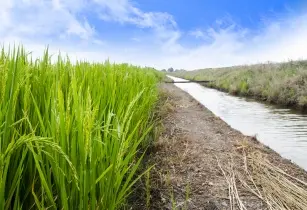DuPont and Water.org have partnered to increase global access to safe water, with a focus on communities most vulnerable to the consequences of water scarcity
The partnership combines DuPont’s technical leadership in water filtration and purification solutions with Water.org’s experience in market-driven financial solutions to the global water crisis. The organisations intend to collaborate on ways to innovate and deploy climate-resilient, sustainable water solutions that can scale to people living in poverty.
Gary White, co-founder of Water.org said, “This partnership is based on the shared belief that solving the water crisis is possible within our lifetimes said. Our team looks forward to working with DuPont to uncover new opportunities to leverage technology to empower people in need with the water and sanitation solutions they need to survive and thrive.”
DuPont awarded Water.org an initial grant to provide 100,000 people with one year of access to safe water or improved sanitation, in areas facing water scarcity and climate challenges in the countries where Water.org works. This includes India, Indonesia, Bangladesh, the Philippines, Cambodia, Kenya, Tanzania, Uganda, Mexico, Brazil and Peru. The funding supports Water.org’s solution, WaterCredit, that aims to break down the financial barriers between people living in poverty and access to safe water and sanitation.
HP Nanda, global vice president, DuPont Water Solutions said, “Around the world, we are witnessing the impacts of climate change through the lens of water, with those living in poverty most vulnerable to the growing threats of water scarcity caused by global warming. We believe the pending water crisis can be avoided, and water can become abundant, affordable and accessible to everyone no matter where they live. It’s through partnerships with highly impactful and creative organisations like Water.org that this vision becomes a reality.”
According to DuPont, currently one in 10 people around the world which is approximately 771 million people lack access to safe drinking water.
Kimberly Kupiecki, sustainability leader for DuPont Water Solutions said, “Reliable access to safe water is a game-changer for those who spend hours walking miles each day retrieving unsafe water for basic needs. It allows young children to attend school, families to create wealth and improves health and well-being overall. United Nations Sustainable Development Goals No. 6 - while itself a critically fundamental goal for human prosperity—is essentially interconnected with almost every other goal for sustainable development.”
The two organisations were introduced to each other’s work after participating in ‘Brave Blue World, a documentary available on Netflix that paints an optimistic picture of how humanity is adopting new technologies and innovations to re-think how water is managed. DuPont and Water.org are also working together through the Water Resilience Coalition, a ceo-led coalition of the UN Global Compact’s CEO Water Mandate that aims to elevate global water stress to the top of the corporate agenda and preserve the world’s freshwater resources through collective action in water-stressed basins and ambitious, quantifiable water stewardship commitments.
DuPont believes that collaboration and collective action will be required to build a water-optimised world where each of the planet’s 7.8 billion people all have daily access to safe water. From innovating sustainable water technologies and collaborating with organisations like Water.org to sponsoring the ‘City Water Optimization Index’ with Economist Impact, DuPont is working with customers, governments, NGOs and thought leaders to uncover a wide variety of solutions to enable a safe, affordable and ample water supply now and for generations to come.
DuPont’s technologies, helps purify more than 25 million gallons of water every minute around the world, enable water reuse and recycling, desalination and the safe access of both ground and surface water. The company offers solutions to a variety of water and sustainability challenges through a broad portfolio of water purification and separation technologies including reverse osmosis (RO) membranes, ion exchange resins (IEX), ultrafiltration (UF), electro deionisation (EDI), nanofiltration (NF), membrane bioreactor systems (MBR), membrane aerated biofilm reactors (MABR), membrane degasification, and closed-circuit reverse osmosis (CCRO) systems.





